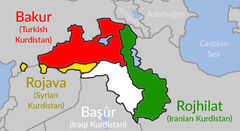Kurdistan
 The modern division of Kurdistan | |
| Interest of | • Henri Barkey • Paul Moran |
Kurdistan is an historical region of the Middle East extending to Iran, Iraq, Syria and Turkey.[1]
According to the CIA Factbook, Kurdistan is home today to some 28 million Kurds, of whom 14.5 million are in Southeastern Turkey ("Bakur" or "Northern Kurdistan"), 6 million in Northwestern Iran ("Rojhilat" or "Eastern Kurdistan"), about 5 to 6 million in Northern Iraq ("Başûr" or "Southern Kurdistan") and less than 2 million in Northern Syria ("Rojava" or "Western Kurdistan").[2][3][4]
Some Kurdish nationalist organisations seek to create an independent nation state consisting of some or all of these areas with a Kurdish majority, while others campaign for greater autonomy within the existing national boundaries.[5][6]
Related Documents
| Title | Type | Publication date | Author(s) | Description |
|---|---|---|---|---|
| Document:How did the US rename a terror group to work with it | Article | 24 January 2018 | Murat Yetkin | So Mr Tillerson, contrary to what CENTCOM and Brett McGurk keep telling you, the Syrian Democratic Forces are not a “truly multi-ethnic” group of freedom fighters uniting against ISIL barbarism. The handful of Arab tribes in the SDF are there for cosmetic purposes only, as part an effort to cover up cooperation between US forces and a group that your administration official designates a “terrorist group.” |
| Document:Washington Wants Syria's Oil | Article | 30 August 2017 | Anna Jaunger | The future of Syria and its geopolitical strategic equation will depend on who controls the oil-rich region of Deir al-Zor. |
Many thanks to our Patrons who cover ~2/3 of our hosting bill. Please join them if you can.
References
- ↑ "Why should Kurdistan become an independent country?"
- ↑ Kurdish Awakening: Nation Building in a Fragmented Homeland, (2014), by Ofra Bengio, University of Texas Press
- ↑ "The Columbia Encyclopedia, Sixth Edition, 2005". bartleby.com.Page Module:Citation/CS1/styles.css must have content model "Sanitized CSS" for TemplateStyles (current model is "Scribunto").
- ↑ "The modern division of Kurdistan"
- ↑ "The Kurdish Conflict: Aspirations for Statehood within the Spirals of International Relations in the 21st Century". Kurdishaspect.com. Retrieved 2011-05-13.Page Module:Citation/CS1/styles.css must have content model "Sanitized CSS" for TemplateStyles (current model is "Scribunto").
- ↑ Hamit Bozarslan “The Kurdish Question: Can it be solved within Europe?”, page 84 “The years of silence and of renewal” in Olivier Roy, ed. Turkey Today: A European Country?.